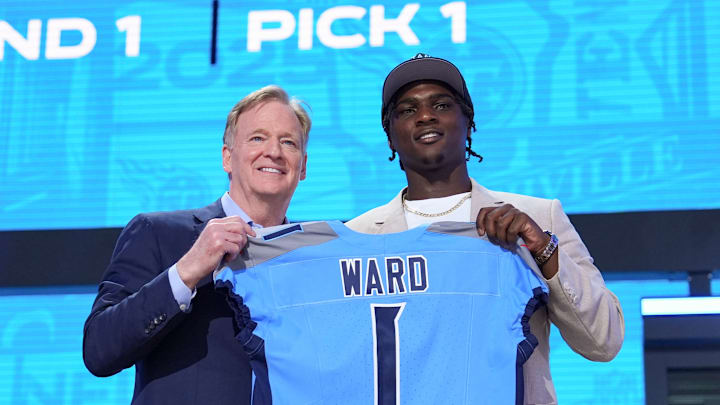The Tennessee Titans are in the second year of a rebuild, and they are in a position where fans could see this team get competitive quickly.
There are still shortcomings on the roster, particularly at EDGE, off-ball linebacker, and possibly wide receiver, too.
However, his is the most talented offensive line the franchise has had since 2019 (Taylor Lewan, Rodger Saffold, Ben Jones, Nate Davis, and Jack Conklin). There is also plenty of reason to be excited about a young receiver or two emerging as starters next to Calvin Ridley, who had more than 1,000 receiving yards last year despite all of the team's issues.
Then on defense, you have the dominant tackle duo of Pro Bowler Jeffery Simmons and potential star T'Vondre Sweat, along with a secondary that could be great if L'Jarius Sneed can be the guy that the Titans thought they were getting when they traded for him.
Then there is also the small matter of drafting a quarterback first overall in Cam Ward from Miami, who just led college football's most dominant offense.
A few more pieces could quickly get the Titans back in the postseason mix. Unfortunately, those pieces are going to be significantly harder to get than they were in the past due to one league-wide alarming trend.
In an article for Acme Packing Company, Justis Mosqueda broke down how smart teams with the richest owners are spending up-front cash to manipulate the salary cap. This is benefitting them from a contention standpoint. It's also crippling the opportunities that rebuilding teams have to build the middle of their roster through free agency.
Basically, what is happening is that those owners are structuring the contracts in ways that pay out up-front cash to limit the damage done to the cap. Through signing bonuses and void years, teams can lower the cap hits of players, and/or push money to future seasons, which will never really hamper the team because, as the cap grows, the value of the dollar decreases every year.
Mosqueda does a great job explaining the numbers, but the thing that will interest Titans fans the most is this excerpt:
"Some teams have now made pushing cap hits into the future a full-blown strategy. The Philadelphia Eagles, coming off of a Super Bowl, have timed up their roster for perpetual salary conversions up to the 2029 season, around the time when the NFL will have a new set of television (or streaming) contracts that will likely increase the salary cap more rapidly than the $25 million per year pace that we’re seeing at the moment. So if the Eagles take on $20 million of debt now, and that $20 million in debt will be a smaller drop in the bucket come 2029, why should they just keep kicking the can forward?
...Previously, the NFL’s parity model worked well. Between the draft, the salary cap and free agency, top teams were torn to shreds as they were unable to keep all of their star players together for long periods of time, which benefited rebuilding teams the most. With the ability to push cap dollars into future years, though, fewer of these star players are getting to market in free agency. Even the pool of veteran cap casualties has taken a hit for teams looking to add talent, as void years and salary conversions have allowed these players to remain on their clubs for an extra year or two."
Titans fans can take some solace in the fact that Chad Brinker and Mike Borgonzi have been very clear that they aren't interested in building through free agency. However, this means the impact of a quarterback on a rookie contract may not be the same cheat code for Tennessee that it was for Washington, for example.
Every NFL team's cash spending 2020-2025 in millions btw pic.twitter.com/R67q3nn9Iq
— Justis Mosqueda (@JuMosq) June 5, 2025
From 2020 to 2025, the Titans ranked 25th in actual cash spending, and that comes after an offseason that saw former GM Ran Carthon go crazy in free agency. That means the Titans aren't taking advantage of the system in the same way that annual contenders San Francisco 49ers, Buffalo Bills, Eagles, and Kansas City Chiefs are.
Going forward, the draft and the trade market are going to be even more important to the Titans' rebuild. They are going to have fewer opportunities to make mistakes because they aren't fully utilizing free agency to course-correct. If the moves the Titans made this offseason work, then they will be in a good place, but getting from "not bad" to "playoff contender" will be harder than it has been in the past, unless the league steps in puts a stop to these cash-spending loopholes.
